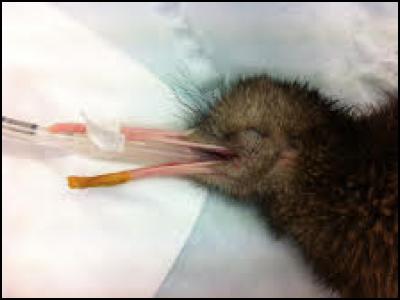Miracle kiwi chick back home at Queenstown’s Kiwi Birdlife
Miracle kiwi chick back home at Queenstown’s Kiwi
Birdlife Park following ground-breaking
surgery

A kiwi chick born
at Queenstown’s Kiwi Birdlife Park just seven weeks ago
has survived all the odds to be back home and fighting fit
after undergoing two rounds of surgery to correct a
mal-positioned beak.
The gorgeous bird, which weighs just 594 grams, hit the headlines and stole the hearts of locals when it was born at the park on October 7 fully-assisted by staff.
The yet-to-be-named chick underwent a fully-assisted hatch once park staff realised it wasn’t able to hatch itself as it was mal-positioned - similar to a breach birth in humans – as it had its foot caught over its head which meant that it was unable to kick free of its shell unaided.
Once born, it was also apparent the chick
had a miss-aligned beak which would hinder feeding and thus
inhibit the growth and potential survival of the
bird.
Upon hearing of the young kiwi’s plight, the team
at Massey University in Palmerston North offered to assist
and suggested a new technique being developed by the
veterinary surgeons at the university’s Wildbase
Hospital.
Kiwi Birdlife Park manager Nicole Kunzmann
decided to send the chick, which is part of the park’s
national breed-for-release programme, north for the surgery
as it was “extremely precious to the park”.
“The
chick is even more special as it was hatched from a fresh
egg and these eggs tend to have a hatch rate of less than
5%. The egg had to be incubated artificially from day one as
the father, Tamanui, wasn’t incubating
it.”
Travelling courtesy of Air New Zealand in the main
cabin with a seat all to itself, the chick certainly turned
the heads of passengers and crew as it made its way safely
back from Palmerston North.
Led by Wildbase director Dr
Brett Gartrell, the team performed corrective surgery on the
bill tip of the kiwi with great results.
“This little chick is only the third bird to have this surgery and in some ways this was the most difficult to bring back into alignment, as the tip of the lower bill had not only deviated sideways like the end of a hockey stick, but had also begun to curl upwards,” said Dr Gartrell.
“It’s taken two very delicate surgeries to bring the bill tip back into alignment without damaging the sensitive blood and nerve supply that kiwi need to be able to sense food at the end of their bills.
“We’re very happy with this little chick's progress and are glad to return it home to Nicole and the team at Kiwi Birdlife Park.”
“This poor wee girl had quite a start to life and it’s been a stressful few weeks. It’s quite amazing that we now have a beautiful kiwi chick that will be fit for wild release and contribute to the national kiwi programme once she reaches 1 kilogram in weight,” said Ms Kunzmann.
“The birth date was quite apt as the timing of the hatch coincided with Save the Kiwi month, an initiative by Kiwis for kiwi to raise awareness of issues facing our national emblem out in the wild,” said Ms Kunzmann.
“We want to name our special kiwi with something that is fitting of her journey. We’re asking members of the public to help us choose a name by picking from one of three names the team here have chosen - Ataahua (Beautiful), Hahana (Radiant light) or Ngaio (Clever).
To enter people should email
marketing@kiwibird.co.nz with their favourite name choice as
well as contact details. The chick’s new name will be the
one with the most votes when entries close midnight Sunday
December 7 2014.
From the entries one lucky person will
also win a Kiwi Birdlife Park prize pack worth $448.
For more details visit the website www.kiwibird.co.nz
ENDS


 Gordon Campbell: On The Hikoi Aftermath
Gordon Campbell: On The Hikoi Aftermath Free Speech Union: Fair Digital News Bargaining Bill Likely To Restrict Access To Information, Polling Shows Most Oppose
Free Speech Union: Fair Digital News Bargaining Bill Likely To Restrict Access To Information, Polling Shows Most Oppose Auckland Transport: Driver Safety Screens Now Rolling Out Across Auckland’s Bus Fleet
Auckland Transport: Driver Safety Screens Now Rolling Out Across Auckland’s Bus Fleet People Against Prisons Aotearoa: 'Expect Resistance' - Community Group Pushes Back Against More Cops With Guns
People Against Prisons Aotearoa: 'Expect Resistance' - Community Group Pushes Back Against More Cops With Guns Greenpeace: New Zealand Drops In Global Ranking On Climate Action
Greenpeace: New Zealand Drops In Global Ranking On Climate Action PSA: Spending Cuts Need To Stop - PSA Urges Govt To Listen To Economists
PSA: Spending Cuts Need To Stop - PSA Urges Govt To Listen To Economists Stats NZ: National Population Estimates: At 30 September 2024 (2018-base)
Stats NZ: National Population Estimates: At 30 September 2024 (2018-base)


